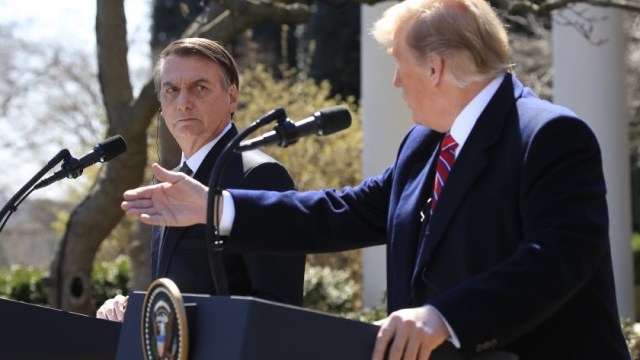
When it came to Latin America, the Trump administration pursued a relatively narrow agenda, focusing on stemming illicit immigration and targeting leftist governments in Venezuela, Cuba and Nicaragua.
By Los Angeles Times – Patrick J. McDonnell – Kate Linthicum
Nov 15, 2020
President Trump visited Latin America only once while in office – a 2018 jaunt to Argentina for a Group of 20 summit – and that trip was mostly about global economic topics, not regional concerns.
To Latin American leaders, he was an unpredictable figure, tweeting threats one day and dispatching extemporaneous compliments another.
The election of Joe Biden will probably bring changes on immigration, climate change, promotion of democracy and fighting corruption – but also, just as significant, a shift in tone.
“There’s no question that Biden will be more predictable than Trump – that’s a pretty low bar,” said Michael Shifter, president of the Inter-American Dialogue, a Washington-based study group. “But it’s important … . You can kind of anticipate what is coming down the road and plan accordingly.”
Trump has slashed aid to Central America, but Biden plans a major increase in economic assistance to the region aimed at reducing inequalities and lessening motivations to emigrate.
Biden has deep ties to Latin America, having served as the Obama administration’s de facto delegate to the region while he was vice president and the State Department was consumed with sundry Middle East crises.
His international policies will probably follow long – standing norms as he embraces multilateralism and traditional diplomacy.
That would be a relief to Latin American leaders who have been kept on edge by Trump’s serial unpredictability and rhetorical flash-bangs.
Colombian President Ivan Duque, for example, was stunned last year to hear Trump both lauding him as a “good guy” and complaining that Duque “has done nothing for us” on stemming drug flows.
For some leaders, however, Biden could be a rude awakening.
Promotion of democracy and anti-corruption initiatives, largely downgraded during the Trump era, will probably see renewed energy.
That could spell difficulties for Honduran President Juan Orlando Hernández, an unindicted co-conspirator in a U.S. drug prosecution that snared his brother, and Nayib Bukele, the Salvadoran president accused at home of subverting the legislative branch and muzzling the press. The Trump administration lauded both leaders for cooperating on White House efforts to stem immigration.
“There has been an insistence from Biden that he will resume anti-corruption efforts … which will be a concern for any corrupt political elites in the region,” said Tiziano Breda, a Guatemala-based analyst for the International Crisis Group, a nonprofit watchdog organization.
Another Trump favorite, Brazilian President Jair Bolsonaro, could face pressure from the Biden administration on a different front. Biden has professed a desire to act against global warming and last week warned that Brazil could face economic consequences if it fails to curb deforestation in the Amazon.
In response, Bolsonaro declared that Brazil would resist “with gunpowder.”
Still, Biden will probably seek to avoid acrimony with Brazil, which has Latin America’s biggest population and largest economy. The two nations have long-standing ties that both leaders have an interest in maintaining.
Brazil is one of many Latin American nations where China has made deep economic and diplomatic inroads, a trend viewed with alarm in Washington. Countering China in the region is shaping up as a Biden priority. And Brazil’s cooperation will be needed as a Biden administration contemplates a revised strategy for Venezuela, where the Trump administration failed in its efforts to oust leftist President Nicolás Maduro, a longtime U.S. adversary.
…
Read More: Los Angeles Times – On Latin America, Biden’s brand of diplomacy will be a major shift from Trump
…

